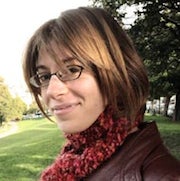 Julia Scott adds new meaning to the term “diving into a story.” An alumna of Metcalf’s 2007 Annual Science Immersion Workshop for Journalists, her experiential reporting style has taken her inside an iron lung after interviewing a woman who relies on the device to breathe. “The experience really informed my reporting,” said Scott. She continued this experiential approach toward her reporting for a New York Times Magazine article, when she went 28 days without using soap to learn, first hand, the benefits of a living bacterial skin tonic.
Julia Scott adds new meaning to the term “diving into a story.” An alumna of Metcalf’s 2007 Annual Science Immersion Workshop for Journalists, her experiential reporting style has taken her inside an iron lung after interviewing a woman who relies on the device to breathe. “The experience really informed my reporting,” said Scott. She continued this experiential approach toward her reporting for a New York Times Magazine article, when she went 28 days without using soap to learn, first hand, the benefits of a living bacterial skin tonic.
“The few times that I’ve done it, it’s taught me that stories in which you make yourself the proxy for a reader and discover the topic together make you a more humble source of information, and also create an opportunity for the reader to really see themselves in the story,” said Scott.
A fulltime freelance writer, Scott has covered a wide range of environmental stories throughout her career, including efforts by scientists to produce heat-tolerant lettuce in the face of climate change, and a story about a science-based maple syrup technique developed to address extreme weather concerns. Her approach has been very successful, as indicated by Scott’s inclusion in “The Best American Science Writing 2010” for her reporting on the role of pesticides in mysterious bee deaths.
Scott says her Metcalf experience at the URI Graduate School of Oceanography (GSO) has helped inform her writing. “I would say that at the time I attended Metcalf, I was trying to understand how local and national stories were connected,” said Scott. “And Metcalf gave me the tools to make those connections.”
Scott’s interactions with GSO researchers through her fellowship also helped her gain a better appreciation for the communication challenges faced by some scientists.
“One thing that really struck me was the fact that scientists really have trouble communicating with the public,” said Scott. “It became clear to me that journalists have a responsibility to act as translators in that relationship, and not only simplify what could be complicated (for the audience), but convey complicated ideas in a way that can be fun and interesting.”
On the subject of fun and interesting, Scott recently published a book called Drivel: Deliciously Bad Writing by Your Favorite Authors, a collection of “esoteric poetry (bad); incoherent and illogical short stories (worse); bumfuzzling proto-journalism (shameful); and pretentious, overwrought journal entries (we’ll not speak of this again)” by famous writers that, according to Scott, illustrates the fact that greatness does not come in one day.
Scott is currently taking a social science approach to a piece she’s working on for the San Francisco Magazine about polyamory in the San Francisco area, the practice of engaging in open relationships.
Read More Alumni Profiles